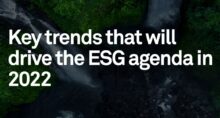
Bron
S&P Global
S&P Global has identified several key, interlinked trends that will drive the ESG agenda in 2022, in a report released recently. The report draws on the knowledge of senior ESG experts across all S&P Global divisions. Following the unprecedented market and policy momentum behind ESG in 2021, investors, corporate boards, and government leaders have raised expectations for progress on climate pledges in 2022.
“Alongside climate, biodiversity and other environmental concerns, social issues like diversity, equity and inclusion and worker wellbeing appear poised to remain in the spotlight, particularly as they are increasingly woven into broader ESG discussions,” said Richard Mattison, President, S&P Global Sustainable1 and a lead author of the report “S&P Global: Key trends that will drive the ESG agenda in 2022.”
Rising demands for action will likely increase pressure for more accountability, greater regulatory scrutiny, and credible disclosure backed by better data.
“Critically, these trends exhibit overlaps and interactions that will have a direct influence on the prospects for meaningful progress on ESG issues in 2022,” said Bernard de Longevialle, Global Head of Sustainable Finance, S&P Global Ratings, and a lead author of the report.
The E, S, and G trends identified below should not be considered in isolation but rather in relation to each other:
- Pressure will grow on corporate boards and government leaders to enhance their ESG skills.
- New regulations and reporting standards will demand more credible corporate disclosures.
- Governments and companies will face the challenge of turning net zero emissions pledges into near-term action.
- Climate transition strategies will increasingly embrace social issues.
- Climate stress testing will gain prominence in the financial services industry.
- Assessing natural capital and biodiversity risks will continue to rise in importance.
- Social issues in supply chains will command more attention.
- The debate over divestment versus engagement will heat up.
- The integrity of the growing sustainable debt market will be tested.
Co-authors of the report are Bruno Bastit, Lindsey Hall, Lai Ly, Paul Munday, and Bruce Thomson.



